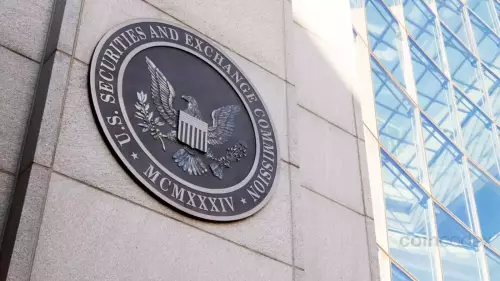 |
|
 |
|
 |
|
 |
|
 |
|
 |
|
 |
|
 |
|
 |
|
 |
|
 |
|
 |
|
 |
|
 |
|
 |
|
Cryptocurrency News Articles
Tokenized Sterling: UK Finance's Bold Step Towards Settlement Enhancement
Sep 27, 2025 at 07:30 am
UK Finance spearheads a tokenized sterling pilot with major banks, aiming to revolutionize UK finance through enhanced payment speed, security, and transparency.

Tokenized Sterling: UK Finance's Bold Step Towards Settlement Enhancement
The UK financial landscape is on the cusp of a revolution, with tokenized sterling leading the charge. UK Finance, representing over 300 financial firms, is pioneering a pilot program to digitize commercial bank money. This initiative aims to enhance payment speed, security, and transparency across the UK.
Pilot Program: A Deep Dive
The pilot program, running until mid-2026, is a continuation of the UK Regulated Liability Network (RLN) project. It focuses on three key use cases: online marketplace peer-to-peer systems, re-mortgaging, and digital settlement of assets. The goal? To boost confidence and fluidity between digital monies and assets.
Key Players and Objectives
Major UK banks like Barclays, HSBC, Lloyds, NatWest, Nationwide, and Santander are on board, with sponsorship from Quant, EY, and Linklaters. They'll explore how tokenized sterling integrates into existing and new financial structures, establishing interoperability between payment networks and institutions. The project also aims to provide tokenisation-as-a-service for firms without in-house systems.
Government Alignment and Global Implications
This pilot aligns with the UK government's ambitions, linking to initiatives like digital gilts and the National Payments Vision. By applying new technologies to existing currency, the UK hopes to modernize its infrastructure and become more competitive in international financial markets. If successful, the tokenized sterling movement could serve as a model for digital adoption globally.
Quant Network's Role
Quant Network is providing the core technology for this financial market initiative. Their CEO, Gilbert Verdian, sees this project as a pivotal moment, aiming to create a new type of programmable money to reshape value management and transfer. Jana Mackintosh, a managing director at UK Finance, believes this collaboration positions the UK as a global leader in setting standards for tokenized currency.
Banks Prioritize Tokenization
The Bank of England's Governor, Andrew Bailey, has expressed a preference for banks to experiment with tokenization over stablecoins, which he fears could destabilize the regulated banking system. While formal stablecoin regulation isn't expected until the end of 2026, this pilot allows banks to explore tokenized deposits within existing rules.
Broader Tokenization Trends
The push for tokenized sterling is part of a larger global trend to tokenize real-world assets (RWAs). Research suggests that half of institutional investors are considering tokenized products, with the market potentially reaching $30.1 trillion by 2034. The UK Treasury is also planning to pilot digital gilts (DIGIT) on distributed ledger technology (DLT).
A Personal Take
From my perspective, this tokenized sterling pilot is more than just a technological upgrade; it's a strategic move to future-proof the UK's financial system. By embracing tokenization, the UK is not only enhancing efficiency and security but also positioning itself as a leader in the evolving digital economy. The collaboration between major banks, innovative tech firms like Quant, and government support creates a powerful ecosystem for success.
Looking Ahead
With leading banks on board, the UK is bringing together trust, compliance, and innovation. If the pilot lives up to its promise, tokenized sterling could revolutionize security, settlement, and financial efficiency in Britain. So, buckle up, folks! The future of UK finance is looking brighter, bolder, and definitely more tokenized. It's gonna be a wild ride, but I'm here for it!
Disclaimer:info@kdj.com
The information provided is not trading advice. kdj.com does not assume any responsibility for any investments made based on the information provided in this article. Cryptocurrencies are highly volatile and it is highly recommended that you invest with caution after thorough research!
If you believe that the content used on this website infringes your copyright, please contact us immediately (info@kdj.com) and we will delete it promptly.






























































